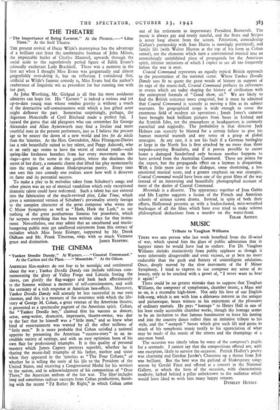THE CINEMA
" Yankee Doodle Dandy." At Warners. " Coastal Command." At the Carlton and the Plaza. " Moontide." At the Odeon.
AMERICAN film-makers do not fear to be nostalgic and sentimental about the war ; Yankee Doodle Dandy can include tableaux com- memorating the glory of Valley Forge and Lincoln freeing the slaves, can glorify the flag-wagger and hark back affectionately to the Somme without a moment of self-consciousness, and with the certainty of a rich response at American box-offices. Moreover, Yankee Doodle Dandy will scarcely be less successful in our own cinemas, and this is a measure of the assurance with which the life- story of George M. Cohan, a great veteran of the American theatre, is presented as a spectacular pageant of the American spirit. Cohan, the "Yankee Doodle boy," claimed that his success as dancer, actor, song-writer, dramatist, impresario, theatre-owner, was due to the fact that he himself was a " little man," and so knew what kind of entertainment was wanted by all the other millions of "little men." It is more probable that Cohan satisfied a national appetite by presenting the American "success-story " in an in- credible variety of settings, and with an easy optimism born of his own flair for professional triumphs. It is this quality of personal mastery which James Cagney portrays superbly, whether he is sharing the music-hall triumphs of his father, mother and sister when they appeared in the 'nineties as "The Four Cohans," or whether he is telling the story of his life to- the President of the 'United States, and receiving a Congressional Medal for his services to the nation, and in acknowledgment of his composition of "Over There," the American anthem of the last war. The film' includes long and sometimes tedious excerpts from Cohan productions, finish- ing with the recent " I'd Rather Be Right," in which Cohan came out of his retirement to impersonate President Roosevelt. The music is always gay and neatly tuneful, and the Stars and Stripes is never long absent from the screen. Patriotism, comradeship (Cohan's partnership with Sam Harris is movingly portrayed), and family life (with Walter Huston at the top of his form as Cohan senior), are the elements which turn a conventional musical into an astonishingly uninhibited piece of propaganda for the American spirit, inferior imitations of which I expect to see all too frequently before the war is over.
Coastal Command represents an equally typical British approach to the presentation of the national scene. Where Yankee Doodle Dandy sees fit to quote the great words of history in support of its saga of the music-hall, Coastal Command prefaces its references to events which are today shaping the history of civilisation with the uninspired formula of " Good show, sir." We are likely to find the British reticence more congenial, but it must be admitted that Coastal Command is scarcely as moving a film as its subject warrants. Its geographical scope is wide enough to cover the enormous field of modern air operations ; Jonah Jones's cameras have brought back brilliant pictures from bases in Iceland and the Scottish Isles, yet the atmosphere at headquarters is curiously parochial and niggardly. The probability is that director Jack Holmes can scarcely be blamed for a certain failure to give his human material warmth and any sense of a grasp of global strategies. At any rate, it is not his fault if a German battichip at large in the North Sea is first attacked by no more than three torpedo-carrying Beauforts, and if it proves possible to escort home a damaged Sunderland only because another happens to have arrived from the Australian Command. These are points for the expert, but the propaganda effect on a layman is disquieting. With a little more care to the dialogue, some shortening, a less emotional musical score, and a greater emphasis on war strategies, Coastal Command would have been one of the great films of the war instead of an interesting and beautifully photographed account of most of the duties of Coastal Command.
Moontide is a disaster. The appearance together of Jean Gabin and Ida Lupino suggests a fusion of the French and American schools of serious screen drama. Instead, in spite of both their efforts, Hollywood presents us with a leaden-footed, mist-wreathed burlesque of all the films which have ever tried to make solemn philosophical deductions from a murder on the water-front.
EDGAR ANSTEY.


























 Previous page
Previous page